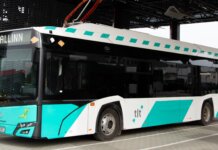On Thursday, Gov. Jack Markell and other Delaware officials announced a new Clean Transportation Incentive Program (CTIP), which will provide state rebates and grants for alternative fuel vehicles and infrastructure.
Administered through the state Department of Natural Resources and Environmental Control's (DNREC) Division of Energy and Climate, the program will support Gov. Jack Markell's environmental and economical goals, according to a DNREC release.
“Delaware is a leader among states in reducing greenhouse gas emissions, improving our state's air quality and promoting innovation in the transportation sector,” said Markell. “The Delaware Clean Transportation Incentive Program supports and advances our commitment by offering Delawareans and Delaware businesses financial incentives to purchase new or retrofitted alternative fuel vehicles and boosting investment in electric vehicle charging equipment and alternative fuel infrastructure.”
“The bottom line is, more of these vehicles on our roadways will benefit Delawareans,” added DNREC Secretary David Small.
With $2.7 million in funding available for the current round of the initiative, CTIP consists of three rebate programs and two competitive grant programs. According to the press release, all rebates and grants are open to Delaware residents, businesses, nonprofits, fleets, and state, county and municipal governments for vehicles titled and registered in Delaware.
CTIP's components include the following:
– The Clean Vehicle Rebate offers applicants who purchase or lease a new or retrofitted passenger vehicle rebates of $2,200 for new battery and/or plug-in hybrid electric vehicles, as well as $1,100 for new or leased dedicated propane and natural gas vehicles and retrofitted electric, propane and natural gas vehicles.
– The Heavy-Duty Vehicle Rebate offers applicants rebates up to $20,000 per vehicle when purchasing new, dedicated natural gas fuel systems for tractor trailers or other heavy-duty vehicles, with fleets limited to five heavy-duty trucks per fleet.
– The Electric Vehicle Charging Infrastructure Rebate offers applicants rebates up to $500 to assist with the purchase and installation of charging equipment for electric vehicles through a 120-volt AC plug (level 1), or a 240-volt AC or 208-volt electrical service (level 2).
– Alternative Fueling Infrastructure Grants are competitive grants available for the development of alternative fueling infrastructure, including propane or compressed natural gas projects or electric vehicle fast-charging stations, limited to 50% of total project costs.
– In combination with Alternative Fueling Infrastructure Grants, Innovative Transportation Greenhouse Gas Reduction Competitive Grants are available to help fund innovative transportation projects that demonstrate greenhouse gas reductions in the transportation sector. This grant is for projects that are not eligible for the other four programs under the Delaware CTIP.
According to the release, seven Delaware auto dealers have partnered with DNREC to assist in promoting and facilitating CTIP programs. The DNREC says these dealers carry some of today's most popular electric vehicles and plug-in hybrid electric vehicles that are eligible for CTIP rebates, including the Chevy Volt, the Nissan Leaf and the Ford Focus. The dealers have offered to provide point-of-sale services, technical assistance and information, as well as assistance with completing the required application for Delawareans and Delaware-based businesses interested in participating in the program.
Funding for the CTIP is made possible by Delaware's participation in the Regional Greenhouse Gas Initiative (RGGI), a market-based cap-and-trade program designed to reduce carbon dioxide and greenhouse gas emissions from the electricity generation sector.
In his remarks, Gov. Markell also highlighted Delaware's progress working across many sectors to reduce greenhouse gas emissions through investments in energy efficiency and renewable energy, as well as by implementing transportation policy and enhancements. As a result, Delaware has reduced emissions by almost 30%.
For more information about the CTIP, click here.






